
Looking back, it’s remarkable how quickly time has flown during my career – and how much has unfolded along the way.
As a foreign medical graduate, transitioning into a new system and beginning residency in pathology was no easy feat. At the same time, I was raising two children and trying to maintain a sense of balance between work and family life. Pathology residency, especially back then, was incredibly demanding and time-intensive. Still, I did my best never to neglect my children – or my wife, who was also a pathology resident at the time. Spending meaningful time with my family remained a top priority, no matter how hectic life became.
I learned that it’s essential to draw a line. Do your best during working hours, then leave work at the door. Don’t let it bleed into your personal life. That separation is vital – not only for your well-being, but also for the people who matter most outside of work. Enjoy your life outside the microscope.
Work–life balance has always been one of the most difficult challenges to navigate. Many assume things get easier after residency, but the reality is often quite different. Starting your first job means proving yourself all over again. You work extra hours, strive to stay on top of daily sign-outs, and do everything you can to show your worth to the team. With time, experience brings some ease, but the pressure to perform never entirely disappears. Exceeding expectations, staying late to finish cases, or responding to urgent intraoperative consultations often becomes the norm.
At some point, you need to pause and reassess. Constant overtime comes at a price. Fatigue builds up, and with it, the risk of errors. When you find yourself drained from staring at slides all day, it’s okay to step back and remind yourself: tomorrow is another opportunity.
Pathology is an intellectually rich field, deeply reliant on pattern recognition and accumulated experience. A case that looks suspicious today might appear more benign tomorrow – simply because you’re viewing it with a clearer mind. That’s why burnout is especially dangerous in this field. It clouds your judgment.
Knowing your limits – and having the courage to say “no” when necessary – is crucial for long-term success.
In any specialty, we strive to be reliable, trusted, and accurate. But that desire to be the “go-to” person can lead to unhealthy levels of stress and fear of falling short. I always tell my residents: don’t try to be a hero – because it’s easier to fall from hero to zero than climb from zero to hero.
If you know the diagnosis, it’s great. If not, ask a colleague. There’s no shame in getting a second opinion. We’re all working toward the same goal: delivering the best care for our patients. There’s no such thing as a “superstar pathologist” with flawless eyes. The more cases you see, the sharper your skills become – it’s that simple.
That’s also why I strongly believe in subspecialization. Focusing on a specific area allows for more profound knowledge and stronger clinical collaborations. As a bone pathologist, I’ve had the privilege of working closely with orthopedic oncologists and musculoskeletal radiologists. These partnerships not only enhance diagnostic precision, but also directly benefit patient outcomes.
Trying to be the best all the time only leads to stress – and ultimately burnout. It’s vital to step back, reconnect with your family, and stay engaged with the world outside of pathology. Achieving that balance keeps you grounded and makes you a better pathologist in the long run.
This is what my career has taught me: Live in the present. Be mindful of the moment. Let go of the past; it’s already behind you. And don’t worry too much about the future – we never truly know what lies ahead.
Dariusz Borys is Orthopaedic Pathologist at Hospital for Special Surgery, New York; Professor of Pathology and Orthopaedic Surgery at New York Medical College




